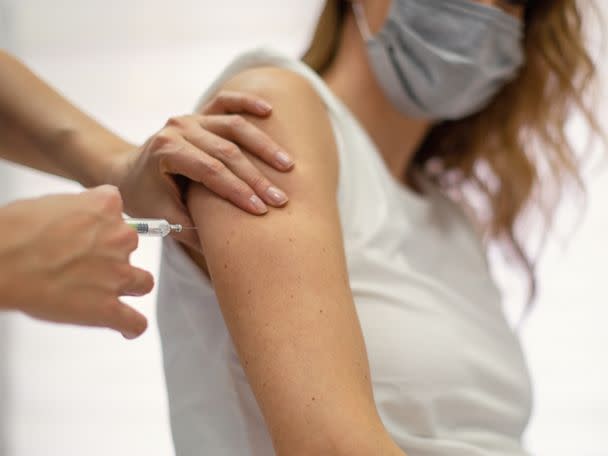As more people in the United States can get vaccinated against COVID-19, the vaccines are not believed to have a “significant impact” on fertility, Dr. Jennifer Ashton, ABC News chief medical editor and board-certified OBGYN. .
The myth that COVID-19 vaccines can negatively impact fertility has largely spread on social media, according to Ashton.
In the US, a higher proportion of women than men are concerned about the safety and potential side effects of COVID-19 vaccines, according to a report from the Kaiser Family Foundation (KFF), a nonprofit that focuses on health issues. About 13% of respondents to the KFF survey, conducted in January, said they believed or were unsure whether the COVID-19 vaccines have been shown to cause infertility.
“This myth of causing infertility, if it did, we would see many miscarriages in women naturally infected with COVID,” Ashton said on Good Morning America Wednesday. “In the field of OBGYN, [there is] really no basis for all that at this point. “
MORE: What Pregnant Breastfeeding People Should Know About COVID-19 Vaccines
Pfizer and BioNTech were the first to evaluate their COVID-19 vaccine in pregnant people when they announced a new trial last week.
Their vaccine, along with Moderna’s, are the two mRNA vaccines currently available in the United States after receiving emergency use approval from the Food and Drug Administration.
MRNA technology does not penetrate the nucleus of the cells or alter human DNA. Instead, it sends a genetic instruction manual that prompts cells to make proteins that the body can learn and develop defenses against future infections.
They are the first mRNA vaccines, which are theoretically safe during pregnancy, as they do not contain live virus.
Moderna has not yet disclosed a timeline for including pregnant people in clinical trials.

Because pregnant women were not actively included in clinical studies of the late-stage vaccines, there is no real data on the impact of COVID-19 vaccines in pregnancy so far.
However, about 20,000 women were diagnosed at some point around the time they were vaccinated, according to Ashton, who added, “There are no unwanted side effects or safety signs in that group.”
“There are some published studies suggesting that pregnant women are likely to transfer antibodies to protect their fetus,” said Ashton. “We’ve certainly seen that in women who are naturally infected and the hope is that we’ll see that in vaccinated women too.”
The question of whether an expectant mother should receive a COVID-19 vaccine will ultimately come down to a number of factors, including everything from the trimester, risk factors for COVID-19, the ability to remain socially aloof in her lifestyle and profession, counseling by federal and state officials and recommendations from the woman’s own doctors, experts say.
As with the flu vaccine, which has not been tested on pregnant women in clinical trials, health experts will have to rely on continuously incoming data to make decisions about how safe the COVID-19 vaccines are during pregnancy.
“When the FDA gave approval, they had about two months of long-term data. That’s about four months now,” Ashton said. “They will continue to monitor women, including the women who became pregnant after they entered the clinical trials, and they will monitor it for two years, so that’s something that will continue.”
MORE: What Women Should Know About Mammograms, The COVID-19 Vaccine
The World Health Organization (WHO) recently updated its guidelines to say that pregnant women at high risk of exposure to COVID-19 and women at risk of serious illness should be vaccinated.
“Although pregnancy puts women at higher risk for severe COVID-19, very little data is available to assess vaccine safety during pregnancy,” the WHO said in a statement. “Nevertheless, based on what we know about this type of vaccine, we have no specific reason to believe that there will be any specific risks outweighing the benefits of vaccination for pregnant women. For this reason, those pregnant women are at high risk. of exposure to SARS-CoV-2 (eg health professionals) or who have co-morbidities that increase the risk of serious disease can be vaccinated in consultation with their healthcare provider. “
MORE: Woman Has No Sense of Taste or Smell 6 Months After Diagnosis of COVID-19: What to Know About Long-Term Complications
The CDC says women who are pregnant and breastfeeding “may choose to get vaccinated” and should talk to their healthcare provider, noting that breastfeeding is an important consideration, but “rarely a vaccine safety concern.”
The American College of Obstetricians and Gynecologists (ACOG), a professional membership organization for OB-GYNs, says both pregnant and breastfeeding women should have access to the vaccine when they are eligible for it, according to the CDC’s Advisory Committee criteria on Immunization Practices (ACIP).
Likewise, the Society for Maternal-Fetal Medicine (SMFM) recommends pregnant women to have access to vaccines and says that pregnant women should “participate” with their doctors about the vaccine.
Overall, SMFM strongly recommends that pregnant women have access to COVID-19 vaccines at all stages of future vaccine campaigns, and that she and her healthcare provider participate in shared decision-making about her vaccine reception. … mRNA vaccines, which are likely to be the first vaccines available do not contain live virus, but rather elicit a humoral and cellular immune response through the use of viral mRNA, “the association said in its statement. “Healthcare professionals should also tell their patients that the theoretical risk of harm to the fetus from mRNA vaccines is very low.”
COVID-19 Vaccines Not Believed to Affect Fertility, Expert Says Originally Published on goodmorningamerica.com
